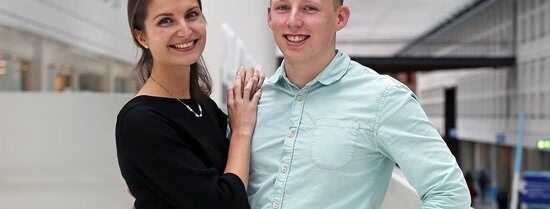Admission requirements
To be considered for our Infection & Immunity research master program you must meet the following requirements:
- You hold, or are currently obtaining, an academic bachelor’s degree (with a minimum of 180 ECs) in Medicine, Biology, Biomedical Sciences, (bio)chemistry, or related studies
or
- You hold, or are currently obtaining, an applied bachelor’s degree (HLO) from laboratory colleges or equivalent
English proficiency
To participate in the educational programmes and tests, sufficient command of the English language is required. This requirement is satisfied if you:
- Hold a diploma from pre-university secondary education (VWO) and the subject English language was part of the examination to obtain that diploma; or
- Hold a diploma from secondary education, obtained from an English-language institution of secondary education within or outside the Netherlands; or
- Hold a final diploma from a four-year English-language higher vocational education programme; or
- Hold a final diploma from a three-year English-language university degree programme; or
- Have taken one of the following tests:
- computer-based Test of English as a Foreign Language (TOEFL) with a score of 232 or higher with partial scores of minimally 23;
- internet-based TOEFL with a score of 90 or higher with partial scores of minimally 22;
- Paper-based TOEFL with a score of 575 or higher with partial scores of minimally 57;
- International English Language Testing System (IELTS) with a score of 6.5 or higher with partial scores of minimally 6.0. One Skill Retake accepted;
- Cambridge proficiency test with level C1 or higher;
- LanguageCert Academic with a score of 70 or higher;
- Pearson PTE Academic with a score of 61 or higher.
Motivation
In your letter of motivation, please demonstrate your specific interest in experimental and applied infection & immunity research by describing your academic interest and stating your reasons to apply for our programme. We are also particularly interested in what you have achieved so far, what you’d like to achieve in the future and your motivation behind this.
On a separate page, please indicate which courses in your bachelor programme (or other academic background) are relevant for Infection and Immunity, including how many weeks or hours you have spent on the course. You may total the hours spent on lectures and self-study.
Please make sure your letter of motivation is no longer than one A4, and the overview on relevant courses is placed on a separate page. This means the motivational document may not be longer than two pages.
Selection of applicants
The Infection and Immunity programme is a numerus fixus programme, meaning only a selection of applicants can be admitted to the programme. The selection process is split into two phases: the letter selection and interviews. During the letter selection, three independent teachers assess the applicants on their letter of motivation, curriculum vitae and transcript of grades. The teachers will score your background in biochemistry, immunology, microbiology and virology. Besides assessing your background knowledge, the teachers will evaluate whether you have the right personal motivation and drive to join the programme and whether your recent activities adhere to the field of I&I. The combined scores given by the three teachers will become the final scoring. The top 40 – 50 performing students will be invited for an interview.
The interview will be added to your overall competence chart and will be part of the final decision for admission to our research master program. During the interview, you will meet three Infection and Immunity teachers, who will ask questions regarding your motivation and background, and will ask some basic knowledge questions about topics related to I&I.
The top 20 applicants of the selection committee will be admitted to our research master program. The other applicants will be on a ranked waiting list. Open/newly available positions will be filled by the applicants on the waiting list in order of ranking.
All applicants will be informed in writing about the outcome of their application. Non-EEA students who do not meet the requirements to enroll for I&I will be rejected in May. Other non-EEA students will be assessed together with the EEA-students in April. Students will be invited for interviews at the end of April. Interviews will be conducted during the first two weeks of May. Mid-May, interviewed applicants will hear whether they will be accepted into the programme. Invited applicants must make a commitment decision before June 1st.
Any rejected student can raise objections by sending an email to msc.infection.immunity@erasmusmc.nl.
Within six weeks, the candidate can formally appeal against the selection committee's decision with the Examinations Appeals Board (CBE).
